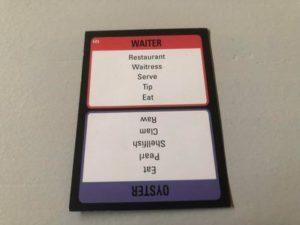For this critical play, we played Taboo.

In terms of type of fun, Taboo promises Challenge, in that not saying common words associated with a word is difficult; Fellowship, because teams have to work together to give hints and guess; and Expression, because at the end of the day, this is a little like a Charades-style game. The packaging and the cards use bright colors, whimsical fonts, and overall have a happy feel not unlike other party games such as twister. Taboo delivers on this whimsical feeling pretty well, and there are enough cards that I feel like we could have played it for longer and not gotten bored. It was also very easy to learn, as party games and games that promise fellowship often are, so people with different experience and familiarity levels were on a pretty level playing field. The randomized teams also helped with evening out the game and making it more competitive.
However, there are a few things I would change about Taboo. First, the card holder is quite finicky and, at least when we played it, it only slowed down the person holding it. It doesn’t really add to the game in any significant way, so I would remove it entirely and I think people would naturally just put cards that they won or lost in piles on the ground.

Second, the sand timer (above) is not a good signal because it’s completely visual and when people are focused on the game, they don’t look at it. Sometimes we would forget about the timer, and by the time someone noticed it, we didn’t know how long the round had been going “overtime” for. Instead, something auditory, maybe even a phone timer that would beep, could be a better cue that a round has ended.
Last, and most important, the team that is not actively guessing is not engaged in the game. That means at least half the time, a player is not engaged in the game. Something that would make this better is to have some kind of mechanic, maybe a way to “steal” a card if the other team guesses it in one try, that would make everyone engaged in every round.


